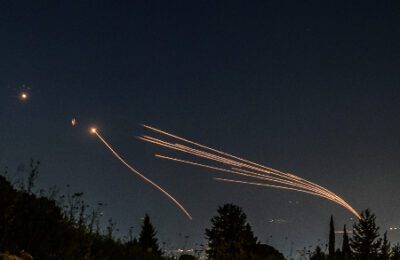
 The tone and theme of Denvers community solidarity gathering for Israel were articulated perfectly in the first few moments of the Jan. 5, Monday evening event.
The tone and theme of Denvers community solidarity gathering for Israel were articulated perfectly in the first few moments of the Jan. 5, Monday evening event.
”We’re not happy to be fighting,” said Cantor Martin Goldstein to at least 1,000 people at the Hebrew Educational Alliance, ”but sometimes you have to do what you have to do.”
At the high energy gathering — which more resembled an indoor rally — speaker after speaker sounded the same note of reluctant defiance.
While expressing sadness for the Palestinians of Gaza who are suffering as a result of Israel’s military incursion, they insisted on Israel’s right to defend itself against sustained Hamas aggression, and made no apologies for exercising that right.
On a brisk and windy night, those attending the rally had to pass through a gauntlet of anti-Israel protesters who had gathered, signs and Palestinian flags in hand, near the entrance to the HEA.
As protesters shouted such epithets as ”Nazis! baby killers!” and “Stop the murder!” some of the Jewish passersby hurled their own verbal lances back at the demonstrators — ” You’re the baby killers!” and ”Down with Arafat!”
The expression and stances of the Denver police officers who were stationed near the demonstrators reflected the tension and potential peril of the confrontation. Perhaps because of their presence, there was no violence.
Inside the relative warmth and quiet of the synagogue lobby, some Jews expressed disappointment that others had stooped to the level of the protesters by joining in the verbal slugfest.
Those who had been chosen to speak at the gathering, whose primary sponsors were the Allied Jewish Federation, Jewish Community Relations Council and Rocky Mountain Rabbinical Council, opted for a more civilized approach albeit far from a pacifist one.
”The usual cast of characters are expressing their dismay at the Israeli incursion into Gaza,” said Rabbi Bruce Dollin of the HEA.
He then castigated those characters for ignoring the fact that while Hamas missiles indiscriminately strike such targets as Israeli kindergartens, Israeli forces routinely telephone Palestinian civilians to warn them of impending attacks.
”This is not moral equivalence,” Rabbi Dollin said. ”This is Israel as a force of good fighting Hamas as a force of violence and hatred.”
Raising his voice, the rabbi declared: “This is a just war and Israel must fight it and must win it unconditionally, with the full support of our government!”
He was answered by loud cheers, and the waving of hundreds of Israeli flags, filling the crowded sanctuary with flashes of blue and white.
Judy Robins, chair of the federations coordinating council, brought to the gathering a personal ground-level view of why Israel decided to militarily cripple Hamas in Gaza.
As part of a group visiting Israel, she spent part of last November in Sderot, the quiet, working class town that has been the most frequent target of rocket attacks from Gaza.
”We hardly saw anybody walking on the streets because they are terrified of rocket attacks,” Robins said.
She described the airborne zeppelins Israel uses as a sort of early warning system when rockets approach the community providing only 15 seconds of actual early warning.
”Imagine having to live your life like that,” Robins said. ”Post-traumatic stress syndrome is a way of life in Sderot.”

 While Sderot might today be the true front line of Israel’s conflict with Hamas, Robins warned that other Negev cities are already under attack and that it wouldn’t be long before Tel Aviv and maybe even Jerusalem were vulnerable.
While Sderot might today be the true front line of Israel’s conflict with Hamas, Robins warned that other Negev cities are already under attack and that it wouldn’t be long before Tel Aviv and maybe even Jerusalem were vulnerable.
Robins reminded her listeners of the comparative distances in Israel. The distance between Gaza and Tel Aviv is comparable to the distance between Robins home in Denver and downtown Colorado Springs.
She also provided examples of how Colorado Jews are already helping Israel cope with the conflict.
Denver’s partner community in the region, Ramat Negev, is providing daily respite programs for children from towns under missile attack and Ramat Negev’s mayor, Shmuel Rifman, is visiting those towns on an almost daily basis.
She read a letter from Rifman, in which the major expressed his profound thanks for the assistance his community is receiving from Colorado Jews.
Robins detailed how AJF funds are helping make air raid shelters in the Negev more bearable by providing heaters, blankets, televisions and games; and how Jewish Agency and JDC programs help provide psychological support for Israelis under fire, loans to Israeli businesses and low-cost computers so that children can study at home when its too risky to go to school.
Robins told her listeners to be proud of the Israelis. “They are standing strong and resilient in the face of this crisis.”
The official Israeli point of view was expressed by Gil Artzyeli, deputy counsel of the Israeli consulate in Los Angeles, who made that point, firstly, with cold statistics.
“In the last seven years,” Artzyeli said, “Hamas and its surrogates have fired over 10,000 rockets into southern Israel. Six thousand of those rockets have been fired in the last three years alone.
“Most of the firing, in other words, has taken place after the Israeli withdrawal from the Gaza Strip.
“Instead of choosing to lay the foundations for a democratic state of Palestine, the Gazans chose Hamas and the promise of prolonged conflict with Israel.
Artzyeli pointed out that he still hears some Palestinians justify the rocket attacks as resistance. “How can it be resistance,” he asked his listeners, “if there is no longer any occupation?”
“The Hamas war against Israel is but another chapter in a sustained and indirect war at Iran’s behest,” the consul stated. “An earlier chapter was Israel’s 2006 fight against Hezbollah in Lebanon, triggered, yet again, by hostile action within Israeli territory in that case, the kidnapping of Israeli soldiers.
“Both Hamas and Hezbollah are proxies of Iran, Artzyeli said, and both are based in territory from which Israel has withdrawn. Their actions demonstrate an intent to wage war on the Jewish state until that state is destroyed.
“When the starting point is I want to kill you, I want to annihilate your country, this is not even a starting point,” Artzyeli said.
He described Hamas as an organization that actively educates its young people to aspire to be martyrs on behalf of Islam.
”If that happened in any other place, Artzyeli said, you would take the parents to a psychiatrist. But this is the norm in Gaza.”
In his opinion, a significant difference between the current war and the Lebanon war more than two years ago is the shift in international opinion.
”We’re not doing so bad, in public relations,” he said. “Actually were doing very well here in the US and in some European countries.”
Beyond the western democracies, Artzyeli stressed, Israel is finding agreement over Gaza — or at least a lack of direct opposition from some Arab states, including Egypt.
”This is a very interesting and very encouraging phenomenon,” he said.
Artzyeli expressed the hope that by the end of the current fighting, not only will the rocket fire be silenced, but that the weapons stockpiles of Hamas will have been seriously depleted or totally destroyed.
He went even further, predicting the emergence of a new leadership in Gaza that will, by dealing with Israel, work toward the benefit of the Palestinian people who are, today, victims of their own regimes.
“A brighter future, both for Israelis and Palestinians, is a possible outcome of the current struggle,” he said.
Instead of missile houses, greenhouses, Artzyeli said of Gaza, predicting that when building a state becomes the primary goal of the Palestinian people, instead of the destruction of Israel, there will be such a state.
“Until that change of heart,” he predicted, “they will continue to fail.”
Brian Friedman, chair of the JCRC, encouraged the audience to write politicians and media outlets to articulate the Israeli argument.

 ”The press is not biased,” Friedman said, ”but it does lack perspective. It is up to us to bring that perspective to them.”
”The press is not biased,” Friedman said, ”but it does lack perspective. It is up to us to bring that perspective to them.”
As he spoke, the program’s one interruption took place. A demonstrator apparently managed to infiltrate the HEA sanctuary. The man was able to shout a few slogans, triggering a chorus of responses, before he was dragged from the synagogue by police and handcuffed.
Friedman was nonplussed at the intrusion, and even managed to inject a dash of humor into an otherwise serious evening. Quipping that he was flattered to be heckled for the first time in his life, Friedman drew laughs when he said of the protester: ”The most important part is that he kept his shoes on.”
After final prayers by Rabbis Joel Schwartzman and Bernard Gerson, and the singing of Hatikvah, the program dispersed.
Asked whether the rally had made her feel any better, one woman smiled wanly as she filed out of the sanctuary.
”Not really,” she said softly, “because I know this problem is going to be with us for a very long time.”
She joined the crowd exiting into the brisk and windy night where, as if to validate her words, the angry cries of the nearby protesters could still be heard.
















